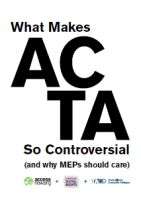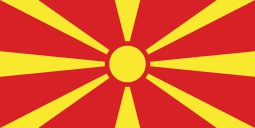European Digital Rights
European Digital Rights (EDRi) is an international advocacy group headquartered in Brussels, Belgium. EDRi was founded in June 2002 in Berlin by ten NGOs from seven countries. In March 2015, the European Council adopted a proposal that may compromise net neutrality,[2] a major concern of EDRi.
 | |
| Abbreviation | EDRi |
|---|---|
| Formation | 2002, Berlin, Germany |
| Type | International non-profit association |
| Purpose | Privacy, Data Protection, Net Neutrality, Copyright |
| Headquarters | Brussels, Belgium |
ED | Claire Fernandez[1] |
| Website | www.edri.org |
History
European Digital Rights (EDRi) is a not-for-profit association registered in Belgium.
European Digital Rights was founded in June 2002 as a result of a growing awareness of the importance of European policy making in the digital environment. European Digital Rights was created in response to some of the earliest challenges in this policy area.
Its founding board members were Maurice Wessling from Bits of Freedom, Andy Müller-Maguhn from the Chaos Computer Club and Meryem Marzouki from Imaginons un Réseau Internet Solidaire. Since inception, EDRi has grown significantly. The current President is Anna Fielder.
In October 2014, 34 privacy and civil rights organisations from 19 different countries in Europe have EDRi membership, and the organisation continues to grow. The need for cooperation among digital rights organisations active in Europe continues to increase as more regulation regarding the Internet, copyright and privacy is proposed by European institutions, or by international institutions with strong effect in Europe.[3]
Activities

EDRi's objective is to promote, protect and uphold civil rights in the field of information and communication technology. This includes many issues relating to privacy and digital rights, from data retention to copyright and software patents, from the right to data protection and privacy to freedom of speech online, from privatised enforcement to cybersecurity.[4][5]
EDRi provides a strong civil society voice and platform to ensure that European policy, which affects the digital environment, is in line with fundamental rights.[6]
Recently, EDRi highlighted fundamental rights issues in the current collective rights management regime and privacy implications of online tracking. The organisation continues to defend citizens' right to private copying, air travellers' privacy and the right to freedom of expression in the notice and takedown debates in Europe. It supports improving citizens' access to audiovisual online content and promotes a legal protection of Net neutrality in Europe. EDRi also fights for an update of copyright in the digital era and against blanket retention of communications data.[7] EDRi's key priorities are currently privacy, surveillance, net neutrality and copyright reform.[8]
In addition to regular publications, such as booklets known as the "EDRi papers", EDRi publishes yearly reports and a bi-weekly newsletter about digital civil rights in Europe, the EDRi-gram.[9]
Campaigns
EDRi launches campaigns to increase public awareness on issues related to information and communication technologies discussed both in the European institutions and on a global level.[10]
Among key campaigns launched by European Digital Rights are, in 2003 and 2011, against Passenger Name Records (PNR),[11] in 2005, against Data retention and in 2010 and in favour of a copyright reform. EDRi actively participated in the vast campaign against ACTA which successfully ended with the rejection of the proposal by the European Parliament in July 2012. During the European elections 2014, EDRi led an innovative campaign to raise the profile of digital rights issues. To this end, EDRi's members drafted a 10-point Charter of Digital Rights that candidates running for the European Parliament could promise to defend. Amongst these principles following are included: promotion of transparency and citizen participation, the support for data protection and privacy, unrestricted access to the Internet, an update for copyright legislation, promotion of online anonymity and encryption, multistakeholderism, and open source software.
European Digital Rights and its members are currently fighting for a European Data Protection Regulation. Through an important awareness-raising campaign, citizens are able to contact Members of the European Parliament representing their country in order to ask them to defend fundamental rights to privacy and data protection.

Members
Statutory membership is restricted to not-for-profit, non-governmental organisations whose goals include the defence and promotion of civil rights in the field of information- and communication technology.[12] The member organisations of European Digital Rights are:

- Epicenter.works
- Initiative für Netzfreiheit ("Internet Freedom Initiative")
- quintessenz
- VIBE!AT
.svg.png)
- Human Rights League (French: Ligue des Droits de l'Homme; Dutch: Liga voor Mensenrechten)

- Internet Society – Bulgaria (Bulgarian: Интернет общество – България)

- Iuridicum Remedium

- IT-Political Association of Denmark (IT-Pol)

- Electronic Frontier Finland (EFFI)

- Chaos Computer Club (CCC e.V.)
- Digitalcourage (formerly FoeBuD, Verein zur Förderung des öffentlichen bewegten und unbewegten Datenverkehrs)
- Digitale Gesellschaft
- Forum InformatikerInnen für Frieden und gesellschaftliche Verantwortung (FIfF e.V.)
- Förderverein Informationstechnik und Gesellschaft (FITUG e.V.)
- Free Software Foundation Europe
- Wikimedia Deutschland

- Icelandic Digital Freedom Society (Icelandic: FSFÍ: Félag um stafrænt frelsi á Íslandi)

- ALCEI (Associazione per la Libertà nella Comunicazione Elettronica Interattiva, "Association for the Freedom of Interactive Electronic Communications")


- Metamorphosis

- Bits of Freedom
- Vrijschrift

- Electronic Frontier Norway

- Modern Poland Foundation (Polish: Fundacja Nowoczesna Polska)
- Panoptykon Foundation (Polish: Fundacja Panoptykon)

- Associação Nacional para o Software Livre (ANSOL, "National Association for Free Software")

- Association for Technology and Internet (APTI)

- Share Foundation

- Society for Open Internet Technologies

- Nodo50.org
- Pangea.org
- Xnet


- Alternative Informatics Association (Turkish: Alternatif Bilişim Derneği)


- Electronic Frontier Foundation (EFF), from their European Office in Brussels
Support
EDRi is financed by membership fees and donations from the public.[13] The organisation receives funding from the Open Society Foundations and the Adessium Foundation, as well as some corporate funding.[14]
See also
- Data protection
- Digital rights
- General Data Protection Regulation
References
- "Welcoming our new Executive Director Claire Fernandez!". 6 November 2018.
- The Editorial Board (10 April 2015). "Editorial - Global Threats to Net Neutrality". The New York Times. Retrieved 10 April 2015.
- "about".
- "Issues". 16 August 2004.
- "Romanian version of EU cybersecurity directive allows warrantless access to data". PCWorld. 2014-12-24. Retrieved 2018-04-27.
- "EU "e-evidence" proposals turn service providers into judicial authorities". EUBusiness. 2018-04-17. Retrieved 2018-04-27.
- "Websites Worry EU May Seek Heavy Copyright Monitoring". Bloomberg law. 2018-04-09. Retrieved 2018-04-27.
- "about". EDRi. Retrieved 2019-09-13.
- "About EDRI-gram". 27 February 2006.
- "Archived copy". Archived from the original on 2013-06-05. Retrieved 2013-05-02.CS1 maint: archived copy as title (link)
- "Passenger Name Record: EU to harvest more data to stop crime". BBC. 2014-12-24. Retrieved 2016-04-16.
- "EDRI Members". EDRI. Retrieved 6 July 2017.
- "Archived copy". Archived from the original on 2013-04-24. Retrieved 2013-05-02.CS1 maint: archived copy as title (link)
- "Annual Reports". EDRi. Retrieved 2020-06-27.